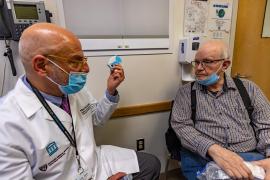First Edition: April 18, 2017
Today's early morning highlights from the major news organizations.
Kaiser Health News:
Florida Congressman Draws Jeers At Home For Backing Failed GOP Health Care Plan
A Republican congressman who in 2010 lost both legs after stepping on a roadside bomb in Afghanistan told an occasionally raucous town hall meeting here that he supports his party’s push to repeal the Affordable Care Act because Americans should be free to go without health care if they so choose. “There are positives and negatives” in the health law known as Obamacare, said Rep. Brian Mast, who noted he gets his health care from the Veterans Health Administration. “I’m not going to pretend this is the easiest thing to work through. (Galewitz, 4/17)
Kaiser Health News:
Kids With Hepatitis C Get New Drugs And Coverage May Prove Easier Than For Adults
With the approval this month of two drugs to treat hepatitis C in children, these often overlooked victims of the opioid epidemic have a better chance at a cure. Kids may have an easier time than adults getting treatment approved, some experts say. Medicaid programs and private insurers have often balked at paying for the pricey drugs for adults, but stricter Medicaid guidelines for kids may make coverage more routine. (Andrews, 4/18)
Kaiser Health News:
A New Worry For Smokers’ Families: ‘Thirdhand Smoke’
Michael Miller, 44, does what most smokers do to protect his sons and daughter from the fumes of his Marlboro Ultra Lights. He takes it outside. After his 7 a.m. coffee, he walks out of his home in Cincinnati to smoke his first cigarette of the day. Then, as a branch manager of a road safety construction company, he smokes dozens more on street curbs. (Heredia Rodriguez, 4/18)
The Wall Street Journal:
Insurers Scramble To Price Plans On Health Exchanges As Policy Seesaws
Health insurers, facing fast-approaching deadlines to file plans for next year’s Affordable Care Act marketplaces amid uncertainty about the law’s fate, are putting off key business decisions as they scour for clues on social media and in the hallways of Washington. A group of insurers meets Tuesday with Trump administration officials, seeking reassurance and greater clarity about the future of the exchanges. Some companies have just weeks to file proposed 2018 rates with state regulators. (Wilde Mathews, 4/17)
The Associated Press:
Trump Group's Ads Bolstering GOP Obamacare Repeal Drive
A pro-Trump group is airing ads in a dozen Republican-held House districts aimed at drumming up support for the White House's wounded drive to repeal President Barack Obama's health care law. The $3 million campaign comes during a two-week congressional recess in which GOP lawmakers' town hall meetings have been rocked by liberal supporters of Obama's 2010 statute. Underscoring the challenges Republicans face, one poll showed Monday that the public trusts Democrats over the GOP on health care by their biggest margin in nearly a decade. (4/17)
The Wall Street Journal:
Poll Suggests Health-Care Fiasco Hurt Paul Ryan’s Standing Among Voters
House Speaker Paul Ryan has a lower job approval rating than President Donald Trump in a new survey released Monday by the Pew Research Center. Less than a month since the collapse of the House GOP health-care bill, only 29% of those surveyed by Pew approved of Mr. Ryan’s job performance, compared to 39% for Mr. Trump — itself a historically low rating for a new president. (Peterson and Ballhaus, 4/17)
The Wall Street Journal:
Theranos Agrees Not To Operate Blood Lab For Two Years
Theranos Inc. and its founder pledged to stay out of the blood-testing business for at least two years in exchange for reduced penalties from federal health authorities, in an agreement that resolves a year-long regulatory impasse. The main lab regulator first had proposed barring Elizabeth Holmes from the medical-lab business for two years in March 2016 after the company failed to correct testing problems at its main lab in Newark, Calif., ones that inspectors earlier had said put patients in “immediate jeopardy. (Weaver, 4/17)
The Associated Press:
Lawsuit: Army Should Factor PTSD In Discharge Decisions
A federal lawsuit filed Monday alleges the U.S. Army has issued less-than-honorable discharges for potentially thousands of service members without adequately considering the effects of post-traumatic stress disorder and other mental health conditions. (4/17)
The Associated Press:
Trump To Sign Bill Extending Veterans' Health Care Program
President Donald Trump plans to sign legislation to extend temporarily a program that gives veterans access to private-sector health care. White House spokesman Sean Spicer says Trump will sign the bill Wednesday at the White House. (4/17)
The Associated Press:
Prince Search Warrants Lay Bare Struggle With Opioids
Court documents unsealed in the investigation into Prince’s death paint a picture of a man struggling with an addiction to prescription opioids and withdrawal, with various pills stashed in bottles around the pop superstar’s suburban Minneapolis studio and estate. But the search warrants and affidavits unsealed Monday shed no new light on how Prince got the fentanyl that killed him. (Forliti, 4/18)
The Associated Press:
Documents Highlight Prince’s Struggle With Opioid Addiction
Before his death, Prince abused opioid pain pills, suffered withdrawal symptoms and received at least one opioid prescription under his bodyguard’s name, according to search warrants and affidavits unsealed Monday. Prince was 57 when he was found alone and unresponsive in an elevator at Paisley Park on April 21. Nearly a year after his accidental overdose death at his suburban Minneapolis studio and estate, investigators still don’t know how he got the fentanyl that killed him. The newly unsealed documents give the clearest picture yet of Prince’s struggle with opioid painkillers. (Johnson, 4/18)
The New York Times:
How Prince Concealed His Addiction: Aspirin Bottles Of Opiates
At the time of Prince’s death, his Paisley Park home and recording compound in Minnesota were strewn with “a sizable amount” of narcotic painkillers for which he did not have prescriptions, including some hidden in over-the-counter vitamin and aspirin bottles and others issued in the name of a close aide, according to newly released court documents related to the investigation into the accidental opioid overdose that killed Prince last year. (Coscarelli and Kovaleski, 4/17)
Los Angeles Times:
None Of The Pills Found At Entertainer Prince's Estate In Minnesota Had Been Prescribed To Him, Court Records Show
Investigators’ records say Prince got his painkillers through others, most recently with the help of a local doctor, Michael Schulenberg, who had started treating Prince in the month before his death. (Pearce, 4/17)
The Associated Press:
Ohio Dealer Who Caused West Virginia Overdoses Sentenced
An Ohio man who sold heroin laced with an elephant tranquilizer that caused more than two dozen overdoses in West Virginia was sentenced to more than 18 years in federal prison Monday. Bruce Lamar Griggs, of Akron, was "in this just for the money" when he sold the heroin mixture that sickened 28 people on Aug. 15 in Huntington, U.S. District Judge Robert Chambers said. (4/17)
NPR:
Drug Treatment At Home Can Be More Effective And Cost Less Than Residential Rehab
Hannah Berkowitz is 20 years old. When she was a senior in high school her life flew off the rails. She was getting high on whatever drugs she could get her hands on. She was suicidal. Berkowitz moved into a therapeutic boarding school to get sober, but could only stay sober while she was on campus during the week. (Rodolico, 4/17)
The Associated Press:
Poll: Marijuana Safer Than Opioids, But Moms Shouldn’t Use
Americans think it’s safer to use marijuana than opioids to relieve pain, but they were less comfortable with children and pregnant women using pot to treat medical conditions, according to a new Yahoo/Marist poll released Monday. Two-thirds of the respondents in the telephone survey said opioid drugs such as Vicodin or OxyContin are “riskier” to use than pot, even when the pain pills are prescribed by a doctor. (Wyatt, 4/17)
The Washington Post:
Why It’s A Bad Idea To Space Out Your Child’s Vaccination Shots
With so many vaccines being required for young children today, some parents are asking their doctors whether they can space out or delay the vaccine schedule. They’re concerned that too many vaccines might overwhelm their child's immune system. Parents also worry that getting more than one shot at a time increases the pain and stress. (Sun, 4/17)
The New York Times:
In A Dragon’s Blood, Scientists Discover A Potential Antibiotic
Biochemists may have discovered a type of antibiotic that sounds like something out of a fairy tale: It is based on dragon blood. Scientists from George Mason University recently isolated a substance in the blood of a Komodo dragon that appeared to have powerful germ-killing abilities. Inspired by the discovery, they created a similar chemical in the lab and dubbed it DRGN-1. (McNeil, 4/17)
The New York Times:
A California Court For Young Adults Calls On Science
Researchers have long known that the adolescent brain is continually rewiring itself, making new connections and pruning unnecessary neurons as it matures. Only recently has it become clear that the process stretches well into early adulthood. Buried in that research is an uncomfortable legal question: If their brains have not fully matured, how responsible are adults ages 18 to 24 for their crimes? (Requarth, 4/17)
Los Angeles Times:
An In-Home Care Program For California's Elderly And Disabled Is Constantly At The Heart Of Budget Battles. Here's Why
California’s program to provide in-home care for its low-income elderly and disabled residents finds itself once again at the heart of a state budget standoff. It is familiar territory for the workers, advocates and administrators of the In-Home Supportive Services program. The current flare-up — between the state and county governments over how to divvy up IHSS costs — is the latest example of how California’s signature program, meant to keep people in their communities and out of nursing homes, has continually been the source of budget friction in recent years. (Mason, 4/18)
Los Angeles Times:
L.A. County Seeks To Strengthen The Safety Net For Its Neediest Residents With Funding For The Homeless, Social Workers And Healthcare
Los Angeles County pressed forward with an effort to strengthen the safety net for its most vulnerable residents Monday with a budget plan that carves out significant allotments for social services, healthcare and other support for the poor. The proposed budget is a slight increase from last year, and officials said they are trying to channel some of that money toward helping those who rely on county government for critical services. (Agrawal, 4/17)






